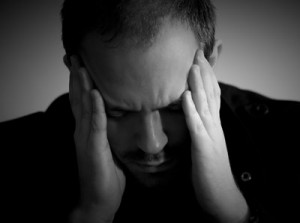There is often some misunderstanding of what it really is, so we should perhaps briefly describe what the medically agreed symptoms of depression are:
 low mood most days (feeling sad or empty)
low mood most days (feeling sad or empty)- lack of pleasure in activities
- low motivation
- irritability
- inability to concentrate & poor memory
- lack of activity and energy generally
- feelings of guilt & worthlessness
- appetite changes
- sleep disturbance
The causes of depression are different for each person, of course, but certain similarities occur:
Early life events:
Some people are more predisposed to depression than others, as a result of their life experience – certain events may cause the development of low self-esteem, poor problem-solving skills or hopelessness.
Beliefs:
Depending on what messages people have been given in life (by peers or parents for example), they may develop a range of dysfunctional, rigid beliefs about themselves, other people, or life generally, for example -
- “I’m weak”,
- “I’m unloveable”,
- “if other people don’t approve of me then I’m worthless”, or
- “if I need people they won’t help me”, or
- “I’m not strong enough to cope if unpredictable things happen”.
Thinking styles:
How we make sense of our life has a big influence on how we feel. An example of this is ‘attributional style’. For instance:
- If a negative event occurs, perhaps a mistake with significant consequences, and you attribute it to an internal, enduring cause (e.g. considering yourself useless), then of course it would tend to make you feel low.
- If you attribute the same event to an internal but transient cause (“I wasn’t paying attention right then”), then you might feel less depressed about it.
- Were you to attribute the event to external factors beyond your control (“anyone would make mistakes under this sort of work stress”), then you might barely feel down about it at all.
This is a simple example of the many attributions we make for what happens in our lives, all of which are just opinions, subjective views, not facts. Depressed people might counter “yes, but I AM useless”, but again this is only an opinion, not a fact.
Current events:
If, on top of these predisposing vulnerabilities, current life events occur which deplete emotional energy or make coping difficult, then depression can develop. Some examples of such events might be:
- A loss of some sort (not just of a loved one, but perhaps a loss of some important aspect of life such as status or health for instance).
- Prolonged stress - the perception that the demands being made of you exceed your available resources; if this is chronic then a state of helplessness (“I’ll never escape”) or hopelessness (“what’s the point”) can develop.
- Periods of anxiety can also precipitate depression, as the feelings of vulnerability, unpredictability and lack of control can create pessimistic beliefs about the future.
Once depression develops, what maintains it?

Another aspect of our selves is our moment-to-moment stream of consciousness; the linguistic content of our thoughts. These have an immediate effect on our mood, so depression can be maintained by ‘Negative Automatic Thoughts’ which take the form of unhelpful styles of thinking.
There are three main themes: –
- the self (eg. - I’m defective or inadequate)
- the future (eg. - it’s hopeless and pointless)
- the world/life (eg. - it’s difficult, uncaring, cruel)
Some common unhelpful thinking styles include:
- Over-generalisation (using words like: always, never, everyone, no-one, everything, nothing)
- All or nothing, categorical thinking (if you’re not perfect then you’re a failure)
- Negative filter (only seeing negative evidence about yourself, ignoring any positives)
- Mind reading (“I know they don’t like me”)
- Catastrophising (“that’s it, I’ll never succeed at this now”)
- Labeling yourself based upon your behaviour (“I did something stupid, therefore I am stupid”)
Self blame:
Lack of compassion for yourself is often a factor in maintaining low mood - even if we are capable of being compassionate and caring towards others, we believe that we don’t merit the same compassion or forgiveness for ourselves. Thus guilt and self-recrimination can become entrenched.
Lack of activity:
Once low mood sets in, energy levels and motivation drop, and as a result people do less. Their opportunities for having fun, for feeling a sense of achievement, for sharing experiences with friends, all diminish. Thus a feedback loop is established, potentially leading to further drops in mood.
Alcohol:
And finally of course, alcohol is a well-known depressant, a substance which many people turn to in times of difficulty, thus compounding the problem.
In the next article, we’ll look at the treatment of depression based upon the causes we’ve identified here.


Thankyou
My first time posting on this website. Found Bright Eye just the other day and waiting for an appointment with a counselor to help me get started. I am very impressed with the range of articles and information. I need support and am very interested in CBT as I feel this is the place to start for me, along with educating myself in general with this site. I am having a hard time finding the cutting down thread so I can start writing more to find support. Can someone help by redirecting me as to start with the best place to introduce myself? many thanks
Hello KMC
Here’s the ‘New Members Introduction’ thread on the forum
Great article and guide -thank you. I was happy not only to find this forum, but this blog, too. Very helpful! I am impressed with the articles I have been reading on here…they have a gift for communicating complex psychological concepts in ways that are so accessible for us…very applicable and understandable. I’ve been struggling with depression and anxiety for years, and I know that I play a large role in all of that myself; I tend to avoid good relationships, to overreact, catastrophize and jump to conclusions, and too often engage in that black and white thinking. CBT has been indeed the only therapeutical approach that has helped me with everything.
Think this is a brilliant example of depression caused by social learnt problems as everyone thinks depression is a mental health problem what’s is not always the case! Iv had CBT to help me notice/capture my negative thoughts then challenge them. It really helped with my social anxiety disorder what then also helped my depression